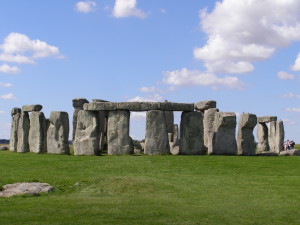The fallacy in Paley's famous Watchmaker analogy was not that the Watchmaker was blind, as Richard Dawkins has suggested. The problem is that Paley's analogy assumed the rock could have always existed in an eternal universe, whereas if physicists are correct and the Big Bang created our universe, we can safely assume the rock has not. No one is certain why a prehistoric civilization built a monument that we call Stonehenge, but we know this peculiar rock formation exists, because we've all seen pictures of it and can easily visit the physical location. Was it a temple to worship the sun? A giant calendar? An ancient medical center? Nobody knows who built Stonehenge, or why it was constructed. We can rather safely assume that someone built it, though. Or can we? What makes us so certain that Stonehenge isn't merely a natural rock formation somehow created miraculously by the vagaries of Time? Because if you listen to Richard Dawkins explain the probability problems associated with our existential questions, he seems to be saying that as long as something is theoretically possible, it doesn't really matter how improbable the event in question might be. What makes us so sure that Stonehenge is not a naturally occurring rock formation? Well, it is extremely unlikely, no matter well how you craft any alternate explanation. The rocks that form Stonehenge appear to have been quarried from a location several miles away. The rocks that form Stonehenge shouldn't be where they are -- unless humans put them there. The rocks shouldn't be stacked and apparently … [Read more...]
http://lyndsaycambridge.com/sitemap-pt-post-2015-01.html Southern Prose
Home of Author and Freelance Writer John Leonard

